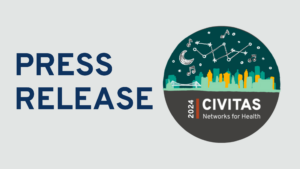By: Lisa Bari and Jolie Ritzo, Photo Credit: Malik Chambers
The Civitas 2023 Annual Conference, held in National Harbor, Maryland, brought together health care leaders, experts, and stakeholders from across the country to share various perspectives on the future of health data exchange and health and health care transformation. With a focus on turning data into action, the conference delivered a wealth of insights, fostering collaborations and partnerships that will shape the health care implementation and interoperability landscape in the year to come.
Coming away from the annual conference, we wanted to share some insights we gathered from our many keynote, unconference, breakout, and stakeholder sessions held throughout our three and half days together.
Here is what we heard we need more of:
Data-Driven Transformation
No surprise here – the central theme of the conference revolved around the idea that data is not merely information; it is a catalyst for change. Civitas and its members have emerged as an important bridge between data and actionable solutions. The health improvement and health information exchange (HIE) industry rallied around the convergence of ideas and organizations, emphasizing the need for more robust data exchange to equip stakeholders and communities in addressing today’s most pressing health care challenges.
Collaboration Over Competition
There is immense power in collaboration. Various entities such as HIEs, emerging Health Data Utilities (HDUs), Regional Health Information Collaboratives (RHICs), All-Payer Claims Databases (APCDs), Community-Based Organizations (CBOs), and Quality Improvement Organizations (QIOs) highlighted instances of unity to tackle issues like maternal health, the opioid crisis, and unmet social needs. The message was clear: to succeed, we must uncover common interests and work together to meet community needs.
Public-Private Partnerships for Transformation
You may have seen the tagline, “Public Private Partnerships Inspire Transformation” on the conference t-shirts, but it is more than just a catchphrase. The importance of partnerships in navigating the complexities of the health care system was a recurring theme this year, with an emphasis that partnerships are not built overnight – they require time, intentionality, and an understanding of different perspectives. Civitas members and stakeholders must continue to actively seek common ground to drive transformation.
Patient-Focused Solutions and Patient Involvement in Conversations
We heard repeatedly that we need to continue to have more patients and caregivers as a part of these conversations – and we wholeheartedly agree. To bring a new perspective to the table this year, our team invited Erin Moore, a patient advocate and founder of Meanwhile Health, to represent the needs of patients and caregivers who were not present. She voiced valuable insights for organizations to integrate patients into their increasingly inclusive processes and governance structures. Suggestions such as RHICs, HIEs, and HDUs* taking an active role developing and sharing patient education resources that help patients in understanding how sharing their data can lead to more informed care and better patient outcomes, ensuring patients are included in developing data sets and data use that are relevant to addressing the challenges faced by patients and caregivers, and building community governance structure so the interests of patients are at the heart of the work being done. While we were excited to increase the patient perspective in our conference sessions, we have further to go and look forward to continuing meaningful discussions at the Civitas 2024 Annual Conference.
Nonprofit Data-Led Entities
The conference acknowledged the vital role played by nonprofit, community-governed, data-led organizations in national interoperability and health improvement. These entities offer neutral convening, data stewardship, advanced technology, community investment, and inclusive governance structures, building trust between stakeholders and community partners. The conference highlighted that the last mile of connectivity often occurs at the local community level, where innovation and implementation thrive. By acting locally, this work will be relevant to the unique needs of the people being served.
Privacy, Security, and Consent Management
With patients increasingly wanting access to their health data and national interoperability drawing closer, the importance of privacy, security, and consent management are paramount. Civitas members were encouraged to leverage existing infrastructure and expertise while exploring new possibilities with what information the data can uncover to transform care delivery in multiple settings. The Civitas national network of member organizations was seen as a platform for shared learning and recommendations on best practices for privacy, security, and consent. While we have work to do in this area, we are optimistic about an interoperable future.

Relentless Support for Public Health
The conference underscored the significance of supporting public health advancements, including workforce development, data modernization, messaging campaigns, and emergency preparedness. Civitas members and partners were encouraged to collaborate with local and state public health agencies to develop meaningful solutions.
Addressing SDOH and Social Care
Speakers and attendees reiterated that Social Determinants of Health (SDOH), and health related social needs are distinct concepts that require uniquely different levers. SDOH are addressed through policy, while social care and needs are met in service settings. A notable example was given in one of the keynote sessions, noting that someone being hungry is a need – to address it, you give them food. The SDOH policy lever to be pulled there is to ensure there is an affordable grocery store in their neighborhood. This underlines how effective change requires different approaches to address these distinctly different, but complementary, concepts.
Embracing Dialogue and Collaboration
Last, but certainly not least, following many years of isolation and uncertainty during the height of the pandemic, in-person gatherings are celebrated for their ability to foster dialogue, working sessions, and workshops. Participants enjoyed working together side-by-side to discuss solutions rather than watching traditional slide presentations. This collaborative spirit will set the stage for future conferences. We are excited to continue building this collaborative environment for our time together at #Civitas2024.
Join Us for #Civitas2024 in Detroit Next October
Mark your calendars for the Civitas 2024 Annual Conference taking place October 15-17, 2024, in Detroit, Michigan. We cannot wait to see you there.
Our Closing Thoughts on #Civitas2023
The Civitas 2023 Annual Conference was a testament to the dedication and innovation of our members and industry partners. The event highlighted the pivotal role all these organizations play in transforming health care by using data-driven solutions, collaboration, and patient engagement. Together we are better.
+++
*In the spirit of being inclusive, please find the definitions for RHIC, HIE, and HDU:
RHIC (Regional Health Improvement Collaborative): RHICs serve as a nonprofit neutral and trusted convenor of key health care stakeholders in their local community or defined geography. They must have multistakeholder governance which may include providers, payers, employers, patients, community organizations, and more -– to help plan, facilitate, and coordinate activities that support health care transformation efforts. Quality Improvement Organizations, Community Health Improvement and Data Collaboratives, and All-Payer Claims Databases may be considered RHICs.
HIE (Health Information Exchange): HIEs enable health care stakeholders to securely access electronic health information by moving clinical data across different health care settings and systems to improve the efficiency, quality, and safety of the patient’s care.
HDU (Health Data Utility): HDUs are models with cooperative leadership, designated authority, and advanced technical capabilities to combine, enhance, and exchange electronic health data across care and service settings for treatment, care coordination, quality improvement, and community and public health purposes. HDUs leverage existing infrastructure through collaboration with state and regional HIEs. In states that are larger in geography or population size, there is often increased complexity and need for coordination within and across regions as well as thoughtful attention to collaboration to meet local, regional, and state needs. Advanced technical services offered by HDUs support the electronic exchange of clinical, non-clinical, administrative, and public health data to address data challenges and achieve greater value for state agencies, payers, providers, community partners, and the public. HDUs integrate data from health-related networks, state agencies, community collaboratives,[1] all-payer claims databases, and other relevant health data registries. The broadened role of HDUs enable complex use cases using clinical and non-clinical data while ensuring the privacy and security of these data. You can learn more about HDUs by visiting our HDU Implementation Guide.





